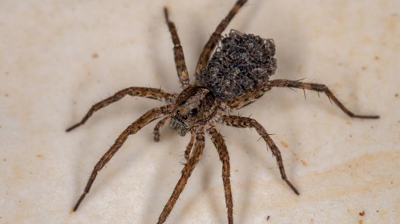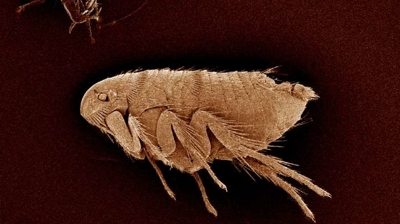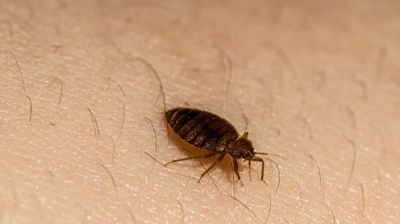
Are Bugs Harmful?
While not all bugs are harmful, several species can cause significant problems for humans, animals, and plants. Here’s how they can be harmful:
Health and Safety Concerns
Some bugs pose risks to human or animal health:
- Allergic reactions: Bites from bed bugs, for example, can cause itching, swelling, and allergic responses in sensitive individuals.
- Blood-feeding species: Some bugs, like kissing bugs (Triatominae), bite humans and animals and can transmit Chagas disease, a serious parasitic infection.
- Secondary infections: Scratching bug bites may lead to skin infections.
Structural and Household Issues
Some bugs invade homes and buildings, causing nuisances or minor damage:
- Boxelder bugs and certain seed bugs: Can congregate in large numbers on walls and windows, creating a mess and potentially staining surfaces.
- Stink bugs: While they do not bite or sting, they release a foul odor when crushed or threatened, making infestations unpleasant.
Nuisance and Quality-of-Life Issues
Even non-toxic or non-biting bugs can negatively affect humans:
- Large aggregations of bugs in homes or gardens can be stressful, cause anxiety, and reduce enjoyment of outdoor spaces.
- Odors from stink bugs or secretions from other bugs can make living spaces unpleasant.
Agricultural and Plant Damage
Many bugs feed on plants by piercing plant tissues and sucking out sap. This can lead to:
- Direct damage to crops: For example, aphids, leafhoppers, and stink bugs can deform fruits, stunt plant growth, or cause leaf curling.
- Reduced yields: Heavy infestations can drastically reduce the quantity and quality of crops, impacting farmers economically.
- Transmission of plant pathogens: Some bugs act as vectors for plant diseases, spreading viruses, bacteria, or fungi from one plant to another. For example, leafhoppers can transmit diseases like aster yellows.
Bugs can be harmful through direct plant damage, disease transmission, bites and allergens, household nuisance, and economic loss. The severity depends on the species, the environment, and the scale of the infestation.
Learn more: Bugs Bite || What Do Bugs Eat?
Bug Removal
Eliminating bugs—such as stink bugs, bed bugs, boxelder bugs, aphids, and other members of the Hemiptera order—is important because they carry a combination of health, structural, and economic risks that most people underestimate. Even when they aren’t directly dangerous, their biology and feeding habits make them extremely disruptive in homes, businesses, and agricultural settings.
Many bugs feed by piercing plant or animal tissue and sucking fluids. In agricultural or landscaping environments, this leads to sap loss, stunted growth, leaf distortion, and in severe cases, plant death. The economic impact can be substantial, especially when species like aphids or leafhoppers transmit plant pathogens as they feed. What looks like a small infestation can escalate quickly because these insects reproduce rapidly and often congregate in high densities.
Several species of true bugs pose significant public health concerns. Bed bugs are the most well-known example. While they do not spread disease, their bites cause allergic reactions, sleeplessness, and psychological stress. Their cryptic hiding behavior and explosive reproduction make them incredibly difficult to eliminate without professional intervention, turning a small unnoticed introduction into weeks or months of discomfort.
Some bugs create persistent indoor nuisances. Stink bugs and boxelder bugs, for instance, invade structures in large numbers when seeking overwintering sites. Their presence leads to foul odors, staining on walls and fabrics, and constant indoor activity during warm spells. Once inside, they can be extremely difficult to remove because they hide deep in wall voids, attics, and around windows.
Ignoring these pests allows them to establish stable populations that are far harder and more expensive to eliminate later. Bugs often exploit small entry points, changing weather patterns, and seasonal cycles, meaning early control prevents larger infestations and ongoing property disruption.
Resolving bug problems promptly protects health, comfort, property value, and, in many cases, the surrounding environment.
Learn more: How To Get Rid Of Bugs
Bug Control
Hiring our professional bug control services is one of the most effective steps you can take to protect your home or business from infestations that threaten your health, property, and peace of mind. While DIY sprays and store-bought traps may provide temporary relief, they often fail to address the root of the problem. Here are some of the reasons why our professional bug control is worth investing in:
- Expert Identification and Customized Solutions: Not all bugs are alike, and different species require different treatment methods. Our professionals can accurately identify the pest invading your space—whether it’s ants, roaches, spiders, bed bugs, or beetles—and tailor a treatment plan that eliminates them efficiently.
- Long-Term Prevention Instead of Quick Fixes: DIY methods often kill only the bugs you see. Our professionals go deeper, targeting nests, breeding areas, and entry points to ensure the infestation doesn’t come back. We also put preventive measures in place to stop future invasions.
- Protection of Health and Safety: Many bugs can spread diseases, trigger allergies, or cause painful bites and stings. Our professionals ensure safe and effective elimination without putting your family, pets, or employees at risk from misapplied chemicals.
- Advanced Tools and Treatments: We have access to industry-grade products and equipment that are far more effective than anything you can buy off the shelf. These treatments are designed to be both powerful against pests and safe for people when applied correctly.
- Cost Savings in the Long Run: While DIY might seem cheaper at first, recurring infestations can lead to bigger problems, property damage, and mounting costs. Our professionals solve the problem the first time, saving you money, stress, and time.
- Peace of Mind: Knowing that your home or business is being monitored and protected by our experts provides confidence that the problem is handled thoroughly and correctly.
Hiring our professional bug control means you’re not just killing pests—you’re protecting your health, your property, and your peace of mind with expert solutions that last.
Bug Exterminators
Choosing our local exterminators over a national company offers several practical advantages that directly affect the quality, speed, and long-term effectiveness of your pest treatment. Our local exterminators tend to deliver more responsive service because we aren’t constrained by rigid corporate scheduling systems; when bugs appear suddenly or a treatment needs quick follow-up, our nearby technicians can usually respond far faster. That immediacy often prevents a small issue from turning into a larger, more expensive infestation.
Our local professionals also brings deeper familiarity with the specific pests, seasonal patterns, and structural conditions common in your region. Many true bugs and other pests behave differently depending on local climate, vegetation, and building styles. Someone who works in your community every day recognizes those patterns and knows which treatment strategies consistently succeed, which products perform best in your environment, and where bugs typically gain access.
Our local team also stakes our reputation on every job, because we rely heavily on word-of-mouth within the community. That usually translates into more careful diagnostics, clearer communication, and more thorough service, rather than the standardized, volume-driven approach large brands often use. With our local exterminators, you’re able to speak directly with the technician who will perform the work and get customized recommendations instead of scripted one-size-fits-all plans.
Finally, working with our local exterminators keeps your money within the community and supports a business that, in turn, invests in local jobs and services. Many homeowners find that the combination of better responsiveness, stronger expertise in regional pest behavior, and more attentive service makes our local team the more reliable and cost-effective choice for resolving bug problems.
Bug Solutions
Our exterminators use Integrated Pest Management (IPM) to control bugs because this approach addresses infestations comprehensively, targeting the root causes of pest activity rather than simply applying broad chemical treatments. IPM begins with a detailed inspection to identify the species, population levels, nesting or breeding sites, and environmental conditions that attract pests, such as food, moisture, and shelter. Management strategies combine habitat modification, sanitation improvements, physical exclusion, and targeted interventions, including baits or localized insecticide applications when necessary. Regular monitoring allows our exterminators to evaluate the effectiveness of treatments, detect new activity early, and adjust strategies without overusing chemicals. By integrating inspection, prevention, precise control measures, and ongoing monitoring, IPM provides a sustainable, long-term, and environmentally responsible solution for managing bug populations while minimizing health risks, structural damage, and the likelihood of reinfestation.
What Do Bugs Look Like?
True bugs, classified under the order Hemiptera (specifically the suborder Heteroptera), are a large and diverse group of insects distinguished by several anatomical features that set them apart from other insects. While there is variation among species, most true bugs share some common characteristics in terms of appearance:
- Body Shape and Size: Most true bugs have a flattened, oval or shield-shaped body, although some can be elongated or more cylindrical. Sizes vary greatly—from a few millimeters (e.g., aphids) to over an inch long (e.g., giant water bugs).
- Mouthparts: All true bugs have piercing-sucking mouthparts called a rostrum or beak, which they use to suck fluids from plants, other insects, or animals. This beak typically projects downward and is a key identifying feature. Unlike chewing insects (like beetles), true bugs’ mouthparts form a stylet, which allows them to puncture tissues and extract liquids.
- Wings: True bugs typically have two pairs of wings, with the forewings being distinctive. The base of each forewing is thickened and leathery, while the tips are membranous—this combination is called hemelytra. This wing pattern is often visible as an X- or V-shaped pattern when the wings are folded at rest.
- Antennae: Usually have long, prominent antennae, often with 4 or 5 segments. These are different from beetles, whose antennae may be clubbed or elbowed and are often shorter.
- Legs: Most true bugs have long legs, which can be adapted for running, grasping, swimming, or even jumping depending on the species. Aquatic species (e.g., water striders, backswimmers) may have oar-like hind legs for swimming.
- Coloration and Markings: Many true bugs are brown, black, or green, which helps them blend into their environments, especially foliage or bark. Some species have bright warning coloration (red, orange, yellow) to deter predators, especially if they are toxic or have a foul odor.
Where Are Bugs Found?
True "bugs” belong to the order Hemiptera, which includes species such as stink bugs, aphids, leafhoppers, cicadas, bed bugs, and water striders. Unlike general insects, true bugs share distinctive features like piercing-sucking mouthparts and often partially hardened forewings. Their habitats depend on the species, but there are clear patterns where you’re most likely to encounter them:
Outdoor Locations
- Gardens and crops: Aphids, leafhoppers, and plant bugs are common on leaves, stems, and flowers where they feed on plant sap. Stink bugs often feed on fruits and vegetables, especially during late summer and early fall.
- Trees and shrubs: Cicadas emerge from tree roots and spend time on branches and trunks. Lace bugs and other plant-feeding species often live on the underside of leaves.
- Water bodies: Water striders, backswimmers, and other aquatic Hemiptera inhabit ponds, streams, and marshes. These bugs are usually seen skating on the water surface or beneath it.
- Ground and leaf litter: Some terrestrial true bugs, such as seed bugs, live in soil, under rocks, or among decaying leaves.
Indoor Locations
- Bedrooms and living areas: Bed bugs are a notorious indoor Hemiptera, hiding in mattresses, bed frames, baseboards, and furniture cracks.
- Near windows and doors: Stink bugs often enter homes in fall to seek warmth. They congregate around lighted windows, wall edges, or attics.
- Houseplants: Aphids, mealybugs, and other plant-feeding true bugs can infest potted plants and greenhouses.
True bugs tend to be found where their food source is abundant: plant sap, blood (in the case of bed bugs), seeds, or other small insects. Many are seasonal, appearing outdoors in warm months and sometimes migrating indoors for shelter. Moisture, vegetation density, and shelter strongly influence their presence.
Bug Life Cycle
The life cycle of true bugs—members of the order Hemiptera, suborder Heteroptera—is characterized by a process called incomplete metamorphosis or hemimetabolous development. Here's an overview of the life cycle of true bugs:
Egg Stage
- Description: The life cycle begins when the female lays eggs. The number of eggs, their size, and location vary by species.
- Egg-laying Sites: Eggs are typically laid on or near host plants, on stems or leaves, under bark, in soil, or even within protective structures like leaf litter.
- Development Duration: Depending on species and environmental conditions (temperature, humidity), eggs may hatch in a few days to several weeks.
Nymph Stage (Immature Stages)
True bugs go through multiple nymphal instars, usually five, though some species have more or fewer.
- Appearance: Nymphs resemble small adults but lack fully developed wings and reproductive organs.
- Molting: With each instar, the nymph molts (sheds its exoskeleton) to grow. Wings become more prominent as they approach adulthood.
- Feeding: Like adults, nymphs are typically equipped with piercing-sucking mouthparts and feed on plant sap, other insects, or even blood (in the case of some species like bed bugs or kissing bugs).
- Habitat: Nymphs often inhabit the same environment as adults and feed on the same food sources.
Adult Stage
- Maturity: After the final molt, the insect emerges as an adult with fully developed wings (in most species) and reproductive organs.
- Reproduction: Adults mate and continue the cycle by laying eggs.
- Lifespan: Adult longevity varies widely—some live for only a few weeks, while others may survive several months, particularly if they undergo diapause (a type of dormancy) in unfavorable seasons.
Key Features of the Hemipteran Life Cycle
- No Pupation: Unlike complete metamorphosis (egg–larva–pupa–adult), hemimetabolous insects like true bugs do not have a pupal stage.
- Gradual Development: Development from nymph to adult is gradual, with each stage resembling the next more closely.
- Feeding Habits: Most true bugs are plant feeders, but many are predators, and some are blood-feeding. Their mouthparts are adapted for piercing tissues and sucking fluids.
Types of Bugs
- Aphids: Aphids are tiny, soft-bodied bugs that feed on plant sap, often causing damage and spreading disease.
- Bed Bugs: Bed bugs are small, reddish-brown bugs that feed on human blood, typically at night, and hide in cracks and crevices near sleeping areas.
- Boxelder Bugs: Boxelder bugs are black and red bugs that feed on seeds and leaves of boxelder and other trees; they often gather in large numbers on warm surfaces and may enter homes for shelter.
- Cicadas: Cicadas are large, winged bugs known for their loud mating calls and sap-feeding habits on trees and shrubs.
- Kissing Bugs: Kissing bugs are blood-feeding insects that bite humans, usually around the mouth at night, and can transmit Chagas disease.
- Palmetto Bugs: Palmetto bugs are not true bugs, but are actually large cockroaches, often reddish-brown, commonly found in warm, humid areas.
- Stink Bugs: Stink bugs are shield-shaped bugs that feed on plants and release a foul odor as a defense when disturbed.
- Squash Bugs: Squash bugs are flat, brownish bugs that feed on squash and related plants by sucking sap, causing wilting and plant damage.
- Water Bugs: Water bugs are not actually bugs, but large, dark brown to black cockroaches that thrive in damp, cool environments.

Hear From Our Happy Customers
-
"Great Communication"
Tech was on time, communication was great, and he accommodated my needs.
- Alonzo W. -
"Fantastic & Patient"
Jarvis was fantastic and patient. He answered my questions with an in-depth explanation and addressed all of my areas of concern. Would love for him to be my assigned tech going forward. Well done!
- Yonnette M. -
"Professional & Considerate"
I’m pleased with Miche services. Jarvis came today. Professional and considerate. Thank you!
- Judy B. -
"Exceeds Expectations"
I can’t say enough positive things about this company... The tech that came out, Jarvis went above and beyond my expectations. Thank you guys, I will continue using your services.
- Jake M. -
"Wonderful Service"
Wonderful service. Jarvis is great. Took care of everything I needed. Thank you!
- Henry P. -
"Very Knowledgeable"
The tech that arrived was courteous, professional, and very knowledgeable. He was Great.
- Uerial I.




